Keeping your property secure is a big deal for a responsible homeowner or business owner. One important part of this is choosing the right types of deadbolt locks. There are many different deadbolt locks out there, each with its pros and cons.
This article will dig into the most common types of deadbolt locks. We will discuss what makes them good and where they might fall short. Plus, we will share some useful tips to help you pick the safest deadbolt lock for your specific security needs.
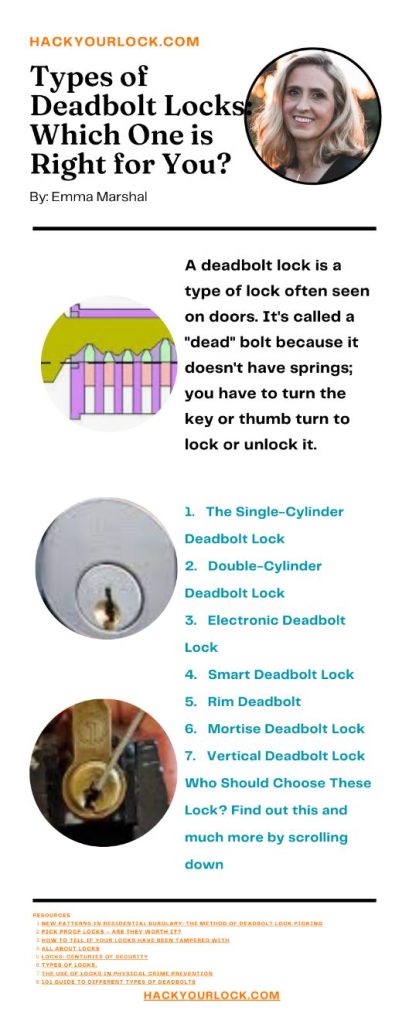
If you want to improve your security, keep reading for some smart advice and expert tips.
Contents
- 1 What is deadbolt lock?
- 2 Types of Deadbolt Locks
- 2.1 1. The Single-Cylinder Deadbolt Lock
- 2.2 2. Double-cylinder deadbolt Lock
- 2.3 3. Electronic Deadbolt Lock
- 2.4 4. Smart Deadbolt Lock
- 2.5 5. Rim Deadbolt
- 2.6 6. Mortise Deadbolt Lock
- 2.7 7. Vertical Deadbolt Lock
- 3 What Types of Deadbolt Locks Is Best?
- 4 8 Exclusive Tips for Choosing the Safest Types of Deadbolt Lock
- 5 Conclusion
- 6 FAQ’s
- 7 Resources
What is deadbolt lock?
A deadbolt lock is a type of lock often seen on doors. It’s called a “dead” bolt because it doesn’t have springs; you have to turn the key or thumb turn to lock or unlock it.
Deadbolts are great for security because they’re tough to force open. They provide extra protection for your home or business.
Deadbolt vs. Deadlock
- A deadbolt is a type of lock that operates by turning a key or knob without the use of a spring. It offers high security because it can’t be easily jimmied open.
- A deadlock is a broader term often used in various lock systems. It generally refers to a lock that can’t be opened or moved without the right key or combination.
Deadbolt vs. Deadlatch
- A deadbolt operates by turning a key or knob to lock and unlock it. It provides strong security as it doesn’t have a spring mechanism.
- A deadlatch, on the other hand, is a type of lock that automatically latches when the door is closed without needing a key or knob to lock it. It’s less secure than a deadbolt but is often used in combination with one to provide convenience and added security.
- Now when you have learnt some differences of similar deadbolt related terms, lets dive into the types of deadbolt locks.
- All About Locks can be helpful in knowing locks other than deadbolts.
Types of Deadbolt Locks
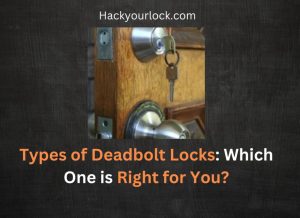
You can choose from a few different types of deadbolt door locks. The most common ones are discussed below:
1. The Single-Cylinder Deadbolt Lock
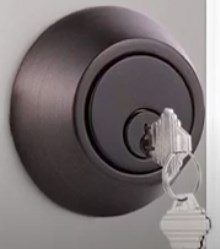
A single-cylinder deadbolt lock is among the types of deadbolt locks commonly used in homes and businesses. It consists of a cylinder that requires a key to unlock from the outside, while on the inside, there’s a twist knob or thumb turn to lock and unlock the door.
This means you can easily lock and unlock the door from inside without a key, but you need a key from outside. Single-cylinder deadbolts, such as front and back doors, are often installed on exterior doors to provide security and control access.
Who Should Choose This Lock?
Homeowners
If you’re looking for a straightforward and easy-to-use lock for your front or back door, the single-cylinder deadbolt is a solid choice.
Businesses
This lock is convenient for businesses with employees coming and going, providing easy access to authorized personnel.
Advantages for Homeowners
1. Ease of Use
You only need a key to unlock it from the outside, while inside, you can use a twist knob for quick and simple access.
2. Affordable
Single-cylinder deadbolts are usually budget-friendly, making them accessible to most homeowners.
3. Suitable for Most Doors
They work well on standard doors and are simple to install.
Disadvantages for Homeowners
1. Less Secure Against Break-Ins
If there’s a nearby window, a burglar might break the glass to reach the twist knob and unlock the door.
2. Limited Security during Emergencies
In case of a fire or other emergency, finding the key can be a hindrance. Just in case there is an emergency, consider using an alternate way to unlock the deadbolt lock with a screwdriver or try without keys option.
Advantages for Businesses
1. Convenience
It’s easy to grant access to employees with keys, and it’s straightforward for them to lock and unlock when needed.
2. Cost-Efficient
Single-cylinder deadbolts are usually cost-effective, making them a practical choice for businesses on a budget.
Disadvantages for Businesses
1. Security Concerns
If a business is located in a high-crime area or has valuable assets, the simplicity of this lock may not provide sufficient security.
2. Limited Key Control
If keys are lost or not returned by former employees, it may pose a security risk, and rekeying can be a hassle.
Check out this video If you want to install a single cylinder deadbolt lock.
Remember, the choice between a single-cylinder deadbolt and other types of deadbolt locks depends on your specific needs, security concerns, and the level of convenience you require for your home or business.
2. Double-cylinder deadbolt Lock
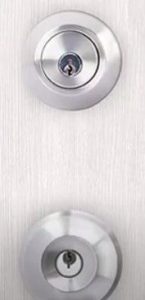
A double-cylinder deadbolt lock is a type of door lock used in homes and businesses. Unlike a single-cylinder lock, it requires a key to lock and unlock the door from both the outside and the inside. This means that a key is always needed to operate the lock.
Who Should Choose This Lock?
Homeowners
Those who prioritize high security and are concerned about potential break-ins.
Businesses
Businesses in areas with security concerns or those that need extra protection for their premises.
Advantages for Homeowners
1. Enhanced Security
The double-cylinder lock requires a key from both sides, making it harder for intruders to bypass the lock.
2. Safety near Windows
It’s a good choice for doors near windows since burglars can’t reach inside to unlock the door.
3. Key Control
You have better control over who has access, as both keys are necessary for operation.
But sometimes you lose the keys. What will you do if you are locked? Try to open deadbolt lock with a credit card …
Disadvantages for Homeowners
1. Safety During Emergencies
Finding the key may delay your exit in case of a fire or other emergencies.
2. Inconvenience
You always need a key to lock and unlock the door, which can be bothersome for everyday use.
Advantages for Businesses
1. High Security
This lock provides robust protection for businesses with valuable assets or security concerns.
2. Controlled Access
It allows precise control over who can enter and exit the premises, enhancing overall security.
Disadvantages for Businesses
1. Emergency Egress
In emergencies, employees may struggle to find the key quickly, which could pose safety risks.
2. Key Management
Managing and safeguarding keys for multiple employees can be challenging and may require additional security measures.
Choosing a double-cylinder deadbolt lock among other types of deadbolt locks depends on your specific security needs, the location of the door, and the level of convenience required for your home or business.
Check out this video if you want to compare single and double cylinder deadbolt lock.
3. Electronic Deadbolt Lock
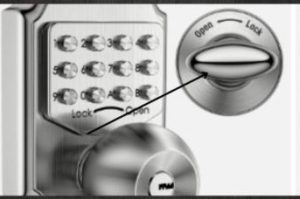
An electronic deadbolt lock is a modern type of door lock that uses electronic components like keypads, touchscreen panels, or remote control to lock and unlock the door, eliminating the need for traditional keys.
Who Should Choose This Lock?
Homeowners
Individuals seeking convenience, advanced security features, and the ability to control access digitally.
Businesses
Enterprises looking for a high-tech and efficient way to secure their premises while monitoring access.
Advantages for Homeowners
1. Convenience
No need to carry physical keys; you can use a code, smartphone app, or even voice command to unlock the door.
2. Advanced Security
Many electronic deadbolts offer features like built-in alarms, access logs, and temporary access codes for guests.
3. Remote Control
You can lock or unlock your door remotely, adding an extra layer of convenience and security.
Disadvantages for Homeowners
1. Power Dependency
Electronic locks require power, so you may temporarily lose access if the battery or electricity fails.
2. Cost
They tend to be more expensive than traditional locks, both in terms of initial purchase and potential maintenance.
Advantages for Businesses
1. Security Control
Businesses can manage access to their premises more efficiently, granting or revoking access digitally.
2. Audit Trail
Electronic locks often provide an electronic record of who accessed the property and when aiding in security monitoring and compliance.
3. Integration
They can integrate with security systems and access control solutions for comprehensive security management.
Disadvantages for Businesses
1. Initial Investment
Implementing electronic locks can involve significant upfront costs, including installation and software setup.
2. Technical Issues
Like any electronic device, they may experience technical glitches, requiring maintenance and troubleshooting.
Electronic deadbolt locks are among types of deadbolt locks that offer modern security and access control solutions, making them a popular choice for those who value convenience and advanced features.
4. Smart Deadbolt Lock
A smart deadbolt lock is a cutting-edge door lock that combines technology and convenience to enhance security.
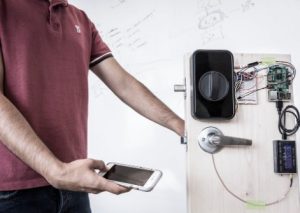
Who Should Choose This Lock?
Homeowners
People looking for advanced security features and the ability to control their lock remotely via a smartphone app or voice command.
Businesses
Enterprises seeking a high-tech and efficient access control solution with real-time monitoring capabilities.
Advantages for Homeowners
1. Remote Control
You can lock and unlock your door from anywhere using a smartphone app, ensuring you never get locked out.
2. Keyless Entry
No more fumbling for keys; you can use your smartphone, a PIN code, or even biometrics like fingerprint or facial recognition.
3. Integration
Smart locks often integrate with home automation systems, allowing you to control your lights, thermostats, and security cameras from a single app.
Disadvantages for Homeowners
1. Tech Dependence
Smart locks rely on technology, so power outages or technical issues can temporarily disrupt access.
2. Price
They tend to be more expensive than traditional locks, and some features may require additional purchases or subscriptions.
Advantages for Businesses
1. Advanced Access Control
Businesses can grant, revoke, or restrict access digitally, reducing security risks.
2. Real-time Monitoring
Smart locks often provide access logs and real-time alerts, aiding in security management.
3. Customization
Businesses can set specific access schedules and permissions for employees and visitors.
Disadvantages for Businesses
1. Initial Costs
Implementing smart locks can involve significant upfront expenses for hardware and software.
2. Technical Challenges
Technical issues, connectivity problems, or cyber threats may require ongoing maintenance and security measures.
Smart deadbolt locks are among types of deadbolt locks that offer the latest security technology and convenience, making them a preferred choice for those wanting to modernize their access control systems.
5. Rim Deadbolt
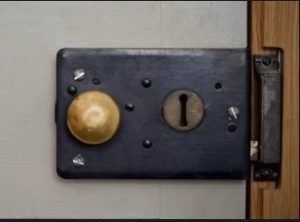
A rim deadbolt is a type of door lock designed for added security and ease of installation.
Who Should Choose This Lock?
Homeowners
Those seeking a secondary lock for their door, especially when a traditional deadbolt may not be suitable due to door design or lack of space.
Businesses
Businesses looking for an extra layer of security on their doors, especially in areas where traditional deadbolts are impractical.
Advantages for Homeowners
1. Simple Installation
Rim deadbolts are easy to install and don’t require intricate door modifications.
2. Visible Deterrent
They serve as a visible deterrent to potential intruders, boosting security.
3. Suitable for Various Doors
Rim deadbolts work well with a wide range of door types, including those with glass panels.
Disadvantages for Homeowners:
1. Less Robust Than Deadbolts
While they enhance security, they may not provide the same level of protection as traditional deadbolts.
2. Exterior Exposure
Rim deadbolts are located on the exterior of the door, making them vulnerable to tampering.
Advantages for Businesses:
3. Quick Installation
Businesses can enhance security without extensive door modifications or disruptions.
4. Visible Security
Rim deadbolts signal a commitment to security and can deter unauthorized access.
5. Compatibility
They can be used on various door materials and designs.
Disadvantages for Businesses:
6. Limited Security
While offering added protection, rim deadbolts may not provide the highest level of security required for some commercial settings.
7. Exterior Vulnerability
Similar to homeowners, businesses should be cautious of the exterior placement of these locks, which could be tampered with.
Rim deadbolts are among types of deadbolt locks that prove to be a practical choice when you need to enhance security without complex installation, making them suitable for homeowners and businesses seeking additional protection.
6. Mortise Deadbolt Lock
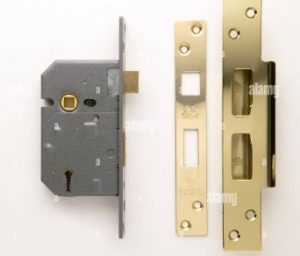
A mortise deadbolt lock is a robust and secure type of door lock that offers exceptional protection against unauthorized access.
Who Should Choose This Lock?
Homeowners
Individuals who prioritize security and want a lock that provides a high level of protection for their homes.
Businesses
Commercial establishments, particularly those with valuable assets or a need for strict access control and security.
Advantages for Homeowners
1. High Security
Mortise deadbolts are known for their strength and resistance to forced entry, making them an excellent choice for home security.
2. Durable
These locks are built to withstand wear and tear, ensuring long-lasting security.
3. Design Options
Mortise locks come in various styles and finishes, allowing homeowners to choose a design that complements their doors.
Disadvantages for Homeowners
1. Complex Installation
Installing a mortise lock can be more involved and may require professional assistance.
2. Cost
They are often more expensive than standard deadbolt locks.
Advantages for Businesses
1. Enhanced Security
Mortise deadbolts provide a high level of security, making them ideal for businesses with valuable assets or security concerns.
2. Access Control
They can be integrated into access control systems, allowing businesses to efficiently manage who enters their premises.
3. Durability
These locks are built to withstand heavy use, making them suitable for commercial settings.
Disadvantages for Businesses:
1. Installation Costs
Installation may require professional assistance, which can add to the initial expense.
2. Complexity
The complexity of mortise locks may require additional training for staff responsible for access control.
Mortise deadbolt locks are among types of deadbolt locks that prove to be an excellent choice for those who prioritize security and durability, whether for their homes or businesses. While installation may be more involved and costly, the level of protection they offer is well worth the investment.
7. Vertical Deadbolt Lock
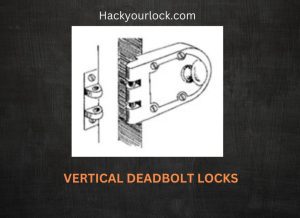
A vertical deadbolt lock is a unique and efficient type of door lock known for its reliability and security features.
Who Should Choose This Lock?
Homeowners
Individuals seeking a specialized lock for added security on their doors, particularly those who want to reinforce their existing locks.
Businesses
Commercial establishments, especially those looking for enhanced security measures on their entry points.
Advantages for Homeowners
1. Enhanced Security
Vertical deadbolt locks provide an additional layer of security, making it difficult for intruders to force the door open.
2. Minimal Modification
They can often be installed without extensive modifications to the door, making them a practical choice for homeowners.
3. Versatility
These locks are suitable for various door types and materials.
Disadvantages for Homeowners
1. Limited Availability
Vertical deadbolt locks may not be as widely available as standard deadbolts, potentially limiting options.
2. Installation Complexity
While less complex than some other specialty locks, proper installation may require professional assistance.
Advantages for Businesses
1. High Security
Vertical deadbolt locks offer a high level of security, which benefits businesses with valuable assets or strict security requirements.
2. Deterrence
They act as a visible deterrent to potential intruders, bolstering overall security.
3. Customization
Businesses can choose from different models and styles to match their specific needs.
Disadvantages for Businesses
1. Installation Costs
Installation may involve additional costs, especially if professional assistance is required.
2. Availability
Depending on location, finding suitable vertical deadbolt locks may require some searching.
Vertical deadbolt locks are among the types of deadbolt locks that prove to be an effective choice for homeowners and businesses aiming to enhance security without extensive door modifications. While they may require professional installation and have limited availability in some areas, their added protection is valuable.
What Types of Deadbolt Locks Is Best?
| Types of Deadbolt Locks | Best For | Key Features |
| Single-Cylinder Deadbolt | Most homes | Simple, affordable |
| Double-Cylinder Deadbolt | High-security areas | Key required on both sides, less emergency access |
| Electronic Deadbolt | Modern homes | Keyless, remote access, convenience |
| Smart Deadbolt | Tech-savvy users | Smartphone control, advanced features |
| Rim Deadbolt | Reinforcing security | Often used as a secondary lock |
| Mortise Deadbolt | High security, durability | Suitable for homes and businesses |
| Vertical Deadbolt | Versatile for various doors | Enhances security, minimal modifications |
Use this table as a quick reference to help you choose the best deadbolt lock based on your specific needs and preferences.
8 Exclusive Tips for Choosing the Safest Types of Deadbolt Lock
| 1. Prioritize High-Quality Brands |
| 2. Look for ANSI/BHMA Grading |
| 3. Choose the Right Type for Your Needs |
| 4. Consider Double-Cylinder for High Security |
| 5. Explore Electronic or Smart Options |
| 6. Reinforce Entry Points with Additional Locks |
| 7. Seek Professional Installation |
| 8. Regularly Maintain and Test Your Locks |
The Use of Locks in Physical Crime Prevention is very important so you must be aware of types of the most popular lock i.e., deadbolt lock.
Following the above tips will help you select a deadbolt lock that provides optimal security for your home or business but 101 Guide to Different Types of Deadbolts is another good resource for gaining ultimate knowledge in this regard.
Conclusion
In conclusion, the choice of the best type of deadbolt locks depends on your unique security needs, budget, and convenience preferences. Whether it’s the simplicity of a single-cylinder deadbolt or the advanced features of electronic and smart locks, each type offers distinct advantages.
For added security, consider reinforcing with a rim deadbolt or opt for a mortise deadbolt for the highest level of protection. Assess your priorities and consult with experts to make an informed decision that enhances the safety of your home or business.
FAQ’s
What’s the difference between a single-cylinder and a double-cylinder deadbolt lock?
Single-cylinder deadbolts have a keyhole on one side and a twist knob on the other. Double-cylinder deadbolts require a key for both sides, offering higher security but potentially slower exit in emergencies.
Are electronic deadbolt locks safe from hacking and tampering?
Most electronic deadbolts have strong security features, but vulnerabilities exist. Choose reputable brands and update firmware for added security.
What’s the advantage of a mortise deadbolt lock over other types?
Mortise deadbolts offer high security and durability, great for maximum protection. They require professional installation and are more expensive but provide peace of mind.
Resources
- New patterns in residential burglary: The method of deadbolt lock picking
- Pick Proof Locks – Are They Worth It?
- How to Tell If Your Locks Have Been Tampered With
- All About Locks
- Locks: Centuries of Security
- TYPES OF LOCKS.
- The Use of Locks in Physical Crime Prevention
- 101 Guide to Different Types of Deadbolts
